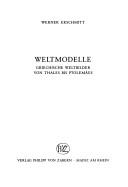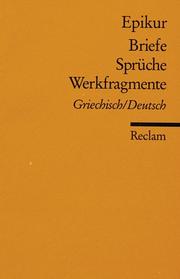| Listing 1 - 10 of 185 | << page >> |
Sort by
|
Book
Year: 1962 Publisher: Basel : Reinhardt,
Abstract | Keywords | Export | Availability | Bookmark
 Loading...
Loading...Choose an application
- Reference Manager
- EndNote
- RefWorks (Direct export to RefWorks)

ISBN: 3805310927 Year: 1989 Publisher: Mainz am Rhein von Zabern
Abstract | Keywords | Export | Availability | Bookmark
 Loading...
Loading...Choose an application
- Reference Manager
- EndNote
- RefWorks (Direct export to RefWorks)
Book
Abstract | Keywords | Export | Availability | Bookmark
 Loading...
Loading...Choose an application
- Reference Manager
- EndNote
- RefWorks (Direct export to RefWorks)
Book
ISBN: 1108542719 1108529089 1108423647 1108540015 1108438229 Year: 2019 Publisher: Cambridge : Cambridge University Press,
Abstract | Keywords | Export | Availability | Bookmark
 Loading...
Loading...Choose an application
- Reference Manager
- EndNote
- RefWorks (Direct export to RefWorks)
How did the ancient Greeks and Romans conceptualise order? This book answers that question by analysing the formative concept of kosmos ('order', 'arrangement', 'ornament') in ancient literature, philosophy, science, art, and religion. This concept encouraged the Greeks and Romans to develop theories to explain core aspects of human life, including nature, beauty, society, politics, the individual, and what lies beyond human experience. Hence, Greek kosmos, and its Latin correlate mundus, are subjects of profound reflection by a wide range of important ancient figures, including philosophers (Parmenides, Empedocles, the Pythagoreans, Democritus, Plato, Aristotle, the Stoics, Lucretius, Cicero, Seneca, Plotinus), poets and playwrights (Sophocles, Euripides, Aristophanes, Plautus, Marcus Argentarius, Nonnus), intellectuals (Gorgias, Protagoras, Varro), and religious exegetes (Philo, the Gospel Writers, Paul). By revealing kosmos in its many ancient manifestations, this book asks us to rethink our own sense of 'order', and to reflect on our place within a broader cosmic history.
Book
ISBN: 9788804752653 Year: 2022 Publisher: [Milan] : Fondazione Lorenzo Valla : Mondadori,
Abstract | Keywords | Export | Availability | Bookmark
 Loading...
Loading...Choose an application
- Reference Manager
- EndNote
- RefWorks (Direct export to RefWorks)
Book
Year: 1768 Publisher: A Paris: chez Saillant,
Abstract | Keywords | Export | Availability | Bookmark
 Loading...
Loading...Choose an application
- Reference Manager
- EndNote
- RefWorks (Direct export to RefWorks)
Science --- Cosmology, Ancient --- Soul
Book
ISBN: 9781108834780 Year: 2021 Publisher: Cambridge, United Kingdom ; New York, NY, USA : Cambridge University Press,
Abstract | Keywords | Export | Availability | Bookmark
 Loading...
Loading...Choose an application
- Reference Manager
- EndNote
- RefWorks (Direct export to RefWorks)
"De mundo is a protreptic to philosophy in the form of a letter to Alexander the Great and is traditionally ascribed to Aristotle. It offers a unique view of the cosmos, God and their relationship, which was inspired by Aristotle but written by a later author. The author provides an outline of cosmology, geography and meteorology, only to argue that a full understanding of the cosmos cannot be achieved without a proper grasp of God as its ultimate cause. To ensure such a grasp, the author provides a series of twelve carefully chosen interlocking analogies, building a complex picture in the reader's mind. The work develops a distinctly Aristotelian picture of God and the cosmos while paying tribute to pre-Aristotelian philosophers and avoiding open criticism of rival schools of philosophy. De mundo exercised considerable influence in late antiquity and then in the Renaissance and Early Modern times"--
Book
Year: 1962 Volume: 10 Publisher: Basel : F. Reinhardt,
Abstract | Keywords | Export | Availability | Bookmark
 Loading...
Loading...Choose an application
- Reference Manager
- EndNote
- RefWorks (Direct export to RefWorks)

Abstract | Keywords | Export | Availability | Bookmark
 Loading...
Loading...Choose an application
- Reference Manager
- EndNote
- RefWorks (Direct export to RefWorks)
Cosmology, Ancient --- Ethics --- Philosophy
Book
ISBN: 8460015521 Year: 1979 Publisher: Valladolid Universidad de Valladolid
Abstract | Keywords | Export | Availability | Bookmark
 Loading...
Loading...Choose an application
- Reference Manager
- EndNote
- RefWorks (Direct export to RefWorks)
| Listing 1 - 10 of 185 | << page >> |
Sort by
|

 Search
Search Feedback
Feedback About UniCat
About UniCat  Help
Help News
News